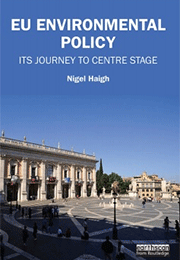The European Union (EU) is currently the topic on everybody’s lips in the UK. More specifically, the 23rd June’s referendum on whether the UK should remain a member. There has been much discussion about the potential implications of ‘Brexit’, ranging from the mundane to the sensational, but most would agree that outside of our own sector, the consequences for the environment haven’t broken through into mainstream debate.
Although Nigel Haigh’s book EU environmental policy: Its journey to centre stage, doesn’t seek to address the Brexit question, its release in the run-up to the referendum is nonetheless timely.
Nigel is an expert on the development and implementation of EU environmental policy. Throughout his career he has contributed extensively to the journey of this agenda from relative obscurity to, as he puts it, ‘centre stage’ (he opened the London office of the Institute for European Environmental Policy and served as its Director until 1998). In this book Nigel reflects on this journey, exploring how the EU contributed to the collective solving of many environmental problems, many of which Member States could not have tackled alone.
After setting the scene with chapters exploring the beginnings of the environmental agenda in Europe, and addressing important questions about how EU policy should be understood, this book revisits previously published material from Nigel’s career to examine many of the major environmental issues tackled by the EU in the past four decades.
 Chapter 4 addresses air pollution and acid rain, one of the major early environmental issues examined by the EU, and an example still regularly cited today of why transboundary collaboration is essential in mitigating many environmental problems. A politically complicated issue, due to the unequal distribution of costs and benefits of regulation between Member States, the author notes that the 1988 Directive on pollution from large combustion plants became an important precedent for dealing with climate change. The chapter makes the case that this Directive was not “made in Brussels”, but was “a truly collaborative venture”. Nigel Haigh argues “No country on its own could have produced a solution and it was the EU, rather than other groupings of countries, that was able to negotiate an effective policy that resulted in action”. The many benefits of working together to solve transboundary problems emerges as a theme throughout the book.
Chapter 4 addresses air pollution and acid rain, one of the major early environmental issues examined by the EU, and an example still regularly cited today of why transboundary collaboration is essential in mitigating many environmental problems. A politically complicated issue, due to the unequal distribution of costs and benefits of regulation between Member States, the author notes that the 1988 Directive on pollution from large combustion plants became an important precedent for dealing with climate change. The chapter makes the case that this Directive was not “made in Brussels”, but was “a truly collaborative venture”. Nigel Haigh argues “No country on its own could have produced a solution and it was the EU, rather than other groupings of countries, that was able to negotiate an effective policy that resulted in action”. The many benefits of working together to solve transboundary problems emerges as a theme throughout the book.
Other chapters address the incorporation of sustainable development into the EU Treaties, EU legislation on water quality and the promotion of a catchment management approach, waste and resource policy, chemicals legislation, the EU’s involvement in global initiatives on climate change and many other topics which cannot here be recounted in depth. The book provides very detailed accounts of how these policies developed, and is really a read for those with more than a casual interest in European policy-making. For those who do find themselves dipping into this world for work or study, it provides a useful guide to the context in which much of the legislation we continue to implement and build on today was established. It offers important lessons about the value of collaboration, and how to do it, which we would do well to heed as we engage in debates about the future of the UK's role in Europe.
The final chapter is penned by Nigel’s successor as Director of IEEP, David Baldock. David’s chapter considers more recent developments in Europe, and uses these experiences to take a tentative look to the future. He starts by declaring “Environmental policy in Europe has not stopped evolving and is most unlikely to do so”. He notes the impacts of the expansion of the EU, and identifies the challenges of integrating the environment with other policy areas. He also explores what restructuring in the new Juncker Commission and the primacy of the ‘Better Regulation’ agenda may mean for environmental policy in the future. Ultimately, this chapter serves as an important reminder that although we have come a long way, we must not fail to recognise “the scale of the challenges ahead”.
EU environmental policy: Its journey to centre stage
Nigel Haigh (author) | ISBN: 978-138-89030-5 | Published: January 2016 | Publisher: Routledge





